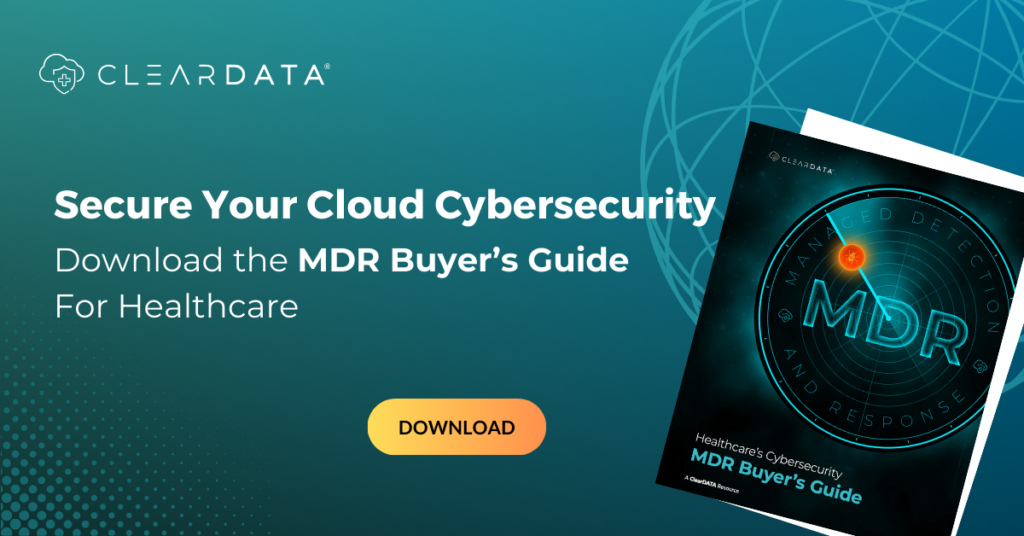For healthcare organizations, privacy, security, and compliance aren’t just priorities; they are table stakes. This is especially true for organizations that are considering moving protected health information to the cloud. At a time when the value of patient data leads the black market, breaches are reaching record levels, and regulatory requirements continue to evolve, healthcare buyers want to know one thing before they even consider a new technology solution: Will it keep my data safe and my organization compliant?
Therein lies the challenge, and opportunity, for healthcare tech companies. Whether approaching a provider, payer, or life science organization, healthcare IT companies need to be sure security and compliance are at the core of their solutions. More importantly, they need to be able to demonstrate the extraordinary measures they have taken to meet these critical needs. If a buyer feels they can trust you with their data, they are more likely to trust you with their business.
What Buyers Don’t Want to Hear
While healthcare organizations want to know that a tech company prioritizes security, privacy, and compliance, they don’t want to hear blanket statements that lack empathy or minimize what’s at stake. Oversimplified comments such as, “We get it,” “We understand HIPAA,” and “Don’t worry” are red flags for buyers, especially during the sales process.
Healthcare organizations don’t want empty promises; they want assurance that a tech company has taken the time to fully understand the challenges those buyers face.
For example, they want to know their vendors understand the hard and soft costs of a security breach, the complexities of daily compliance tasks, and even more importantly, how they are addressing these types of obstacles.
Buyers also don’t want to read or listen to a long list of technology features. While it is tempting for a healthcare IT company to tout the technical bells and whistles of its latest solution, buyers are far more interested in learning about how the solution will solve a real problem they are facing. Technological advancement means little to a healthcare organization unless it makes their day-to-day jobs easier and faster.
For example, while a tech company might highlight the fact that their solution offers two-factor authentication to ensure data privacy and security, a provider may actually view this as a stumbling block. If a doctor’s goal is to see as many patients as possible in the shortest amount of time, having to go through two-factor authentication every time they want to access patient data is a limiting factor that slows down efficiency and actually works against his or her business needs.
What Buyers Do Want to Hear
The key is for tech companies to communicate the ways in which their solutions cater to the unique needs of healthcare organizations, both from a security and compliance standpoint as well as a business performance standpoint. This means getting into the head of the user: What day-to-day problems does the solution address? Will it create new obstacles? Why is the learning curve worth the effort? If a critical issue surfaces, how quickly will it be addressed?
Across the board, healthcare organizations want technology partners to show—not just tell—them the steps they have taken or are willing to take to keep their business safe and thriving. Earn your prospective buyers’ confidence by addressing the following:
- Demonstrate your commitment to compliance. Walk the buyer through what you are doing to safeguard the buyer’s data, as well as the internal procedures you follow to maintain security and privacy within your own company. This is a prime opportunity to share if your company is HITRUST certified or if you are working with a partner that has this certification.
Other details to share include the timing of certifications, relevant audits, renewal plans, response time to security incidents and regulation changes, and use-case examples of how these issues have been handled in the past.
- The risks you are willing to share. Although no one wants to talk about security incidents or noncompliance, buyers do want the assurance that partners will have their back if these situations arise. Too often the financial burden and marketing backlash of data breaches and audit failures fall solely on the healthcare buyer, jeopardizing their business, reputation, and patient safety.
Buyers want to know that, when applicable, vendors will share part of the risk and responsibility if something goes wrong. For example, some tech companies spell out in the BAA the risks it is willing to share with buyers, either financially or from a marketing perspective, and many provide a detailed crisis management plan
- The resources you will make available to them. Service is a critical part of any business relationship, especially when it comes to risk-averse industries like healthcare. Providers, payers, and life science organizations want to feel confident that they will be fully supported before, during, and after the sales phase.
If you have ongoing access to their data, they will want to have ongoing access to you.
Providing potential buyers with a list of contacts, tools, and resources that will be available to help them speaks volumes about the level of service your company can deliver throughout the business relationship. In some cases, this may require bringing in third-party partners to fill in any gaps that fall outside of your company’s core competencies.
Delivery Is Critical
It is also important for healthcare tech companies to remember that how they deliver the message is just as important as the message itself. The way a vendor treats a potential buyer sets the tone for the business relationship and is the first step toward building trust.
There are several strategies healthcare companies can take to ensure their delivery is effective, but the overall aim should be to exhibit your company’s customer experience competencies throughout the sales process. Put simply: Actions speak louder than words.
In general, healthcare organizations are looking to work with partners that demonstrate two key values:
- Customer-focused. Research shows that how a buyer feels impacts their purchasing decision. From day one, a buyer should feel like a priority, not just another sales target. This type of support is especially important to healthcare organizations that are nervous about moving into new, uncharted waters like the cloud.
- Responsive. How a company behaves upfront usually indicates the level of response a potential buyer can expect throughout the business relationship. For example, if a vendor can’t be responsive for basic interactions like phone calls and emails, how can it be trusted to react quickly in the midst of a crisis?
A Trusted Foundation
In the end, today’s healthcare organizations want to feel understood, prioritized, and safe before taking a chance on a new technology solution or service. By prioritizing security and compliance and taking a “show don’t tell” approach, healthcare IT companies can garner the trust of healthcare organizations and begin building the foundation for successful, long-term business relationships.


